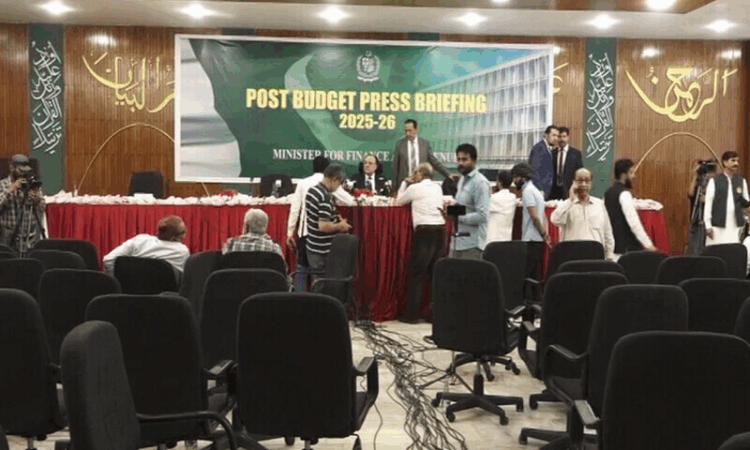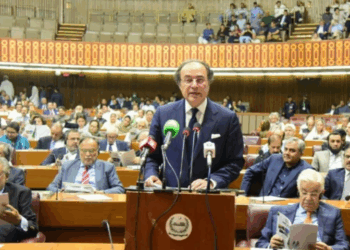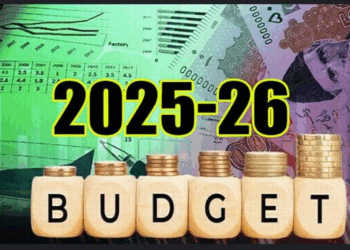Islamabad, June 11, 2025: Finance Minister Muhammad Aurangzeb on Wednesday defended the federal government’s fiscal policies and budgetary decisions for FY2025-26, attributing lower government expenditures in the outgoing fiscal year to valid concerns raised by taxpayers.
Speaking at a post-budget press conference in Islamabad, Aurangzeb emphasized the government’s continued commitment to fiscal consolidation as part of its agreement with the International Monetary Fund (IMF), while attempting to provide modest relief to the salaried class and stimulus to the real estate and construction sectors.
“We have reduced subsidies and debt-servicing costs while increasing some necessary expenditures,” Aurangzeb stated, adding that this approach responds to the “right pushback” from taxpayers who have questioned unchecked government spending. According to him, overall government expenditure rose by just 1.9% this year.
Key highlights from the press conference included:
- Justification of salary hikes for the National Assembly speaker and Senate chairman after nine years.
- Explanation for the levy on imported solar panels.
- Clarification on sector-specific tax measures.
- Acknowledgment of implementation gaps in past reform efforts.
The session was briefly disrupted when journalists walked out, protesting the absence of a technical briefing on the Finance Bill 2025 by the Federal Board of Revenue (FBR). However, the press conference resumed with FBR Chairman Rashid Mahmood Langrial and Finance Secretary Imdadullah Bosal alongside the minister.
Aurangzeb expressed regret over the confusion and pledged more regular engagement with the media, proposing briefings every four to six weeks.
Defending the federal pay and pension increase of 10% and 7%, respectively, Aurangzeb emphasized the need to align such changes with inflation trends.
“If inflation is coming down, salaries and pensions must be benchmarked accordingly. That’s standard practice globally,” he said.
Responding to questions on the minimum wage, currently Rs37,000, Aurangzeb said there were no plans to raise it further, asserting that “we are in a good place” after consulting industry stakeholders.
Aurangzeb reiterated the goal of raising Pakistan’s tax-to-GDP ratio to 10.9% by next year, with Rs312 billion in new tax measures out of a Rs2.2 trillion target. He acknowledged longstanding enforcement failures and highlighted improved tax collection efforts exceeding Rs400 billion.
FBR Inland Revenue Member Dr. Najeeb Ahmad provided details on tiered tax rates for high-value retail items and digital commerce. He noted that:
- Electrical goods sold online were taxed at 0.25% for items under Rs20,000.
- High-end boutiques face a 2% tax rate.
- E-commerce sales tax collection was being reformed to address previous underreporting.
Dr. Ahmad also stressed the importance of adapting tax policies to a rapidly digitizing economy, warning of revenue erosion if foreign e-commerce vendors continued to bypass local tax systems.
Responding to criticism over the 18% sales tax on imported solar panels, FBR Chairman Langrial explained the rationale: assembled panels from abroad had an unfair advantage over locally assembled ones, discouraging domestic manufacturing.
“We had to level the playing field. Incentives are no longer necessary now that the payback period is just two years,” Langrial said.
Aurangzeb noted that additional taxes on fertilisers and pesticides had been dropped following IMF negotiations, citing agriculture’s critical role.
On youth initiatives, he emphasized the need to enable freelancers and coders. “We’re working to ensure those earning $8–10 an hour can reach $100,” he said, calling on the private sector to take the lead.
The finance minister highlighted tariff reductions on over 2,700 raw material items under the five-year National Tariff Policy to boost exports.
“This is Pakistan’s East Asia moment,” he said, promising further gradual reforms.
Aurangzeb also addressed investor concerns, noting that protectionist policies must end to enhance competitiveness.
Regarding bond repayments, he confirmed that the first $500 million Eurobond installment is due in September, with another in March 2026. He assured the government is “prepared and willing to pay.”
Aurangzeb expressed hopes of issuing yuan-denominated Panda bonds this year and added that international credit market access is expected in 2026, depending on improved credit ratings.
Closing his remarks, Aurangzeb acknowledged the slow pace of reform and burden on the formal sector and salaried class.
“The direction has changed. We’ve started reversing long-standing imbalances, but this is only the beginning,” he said. “We must signal our seriousness with actions, not just words.”








